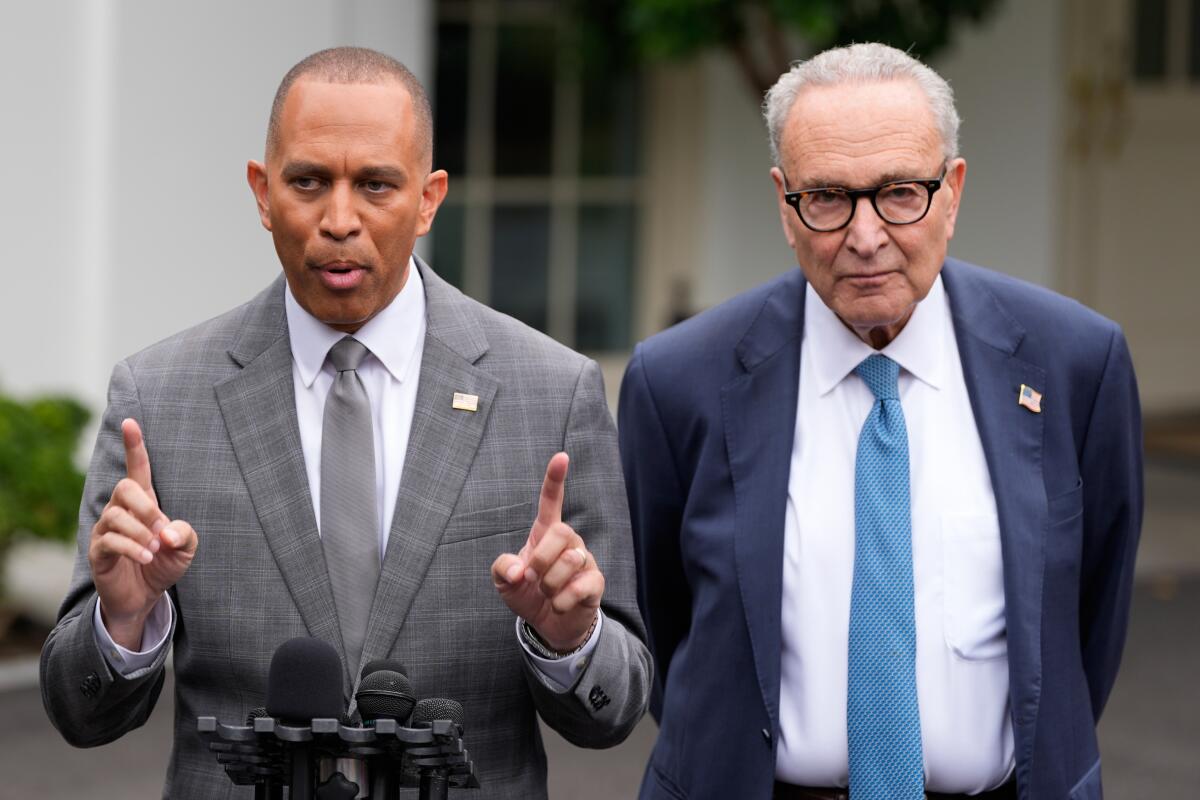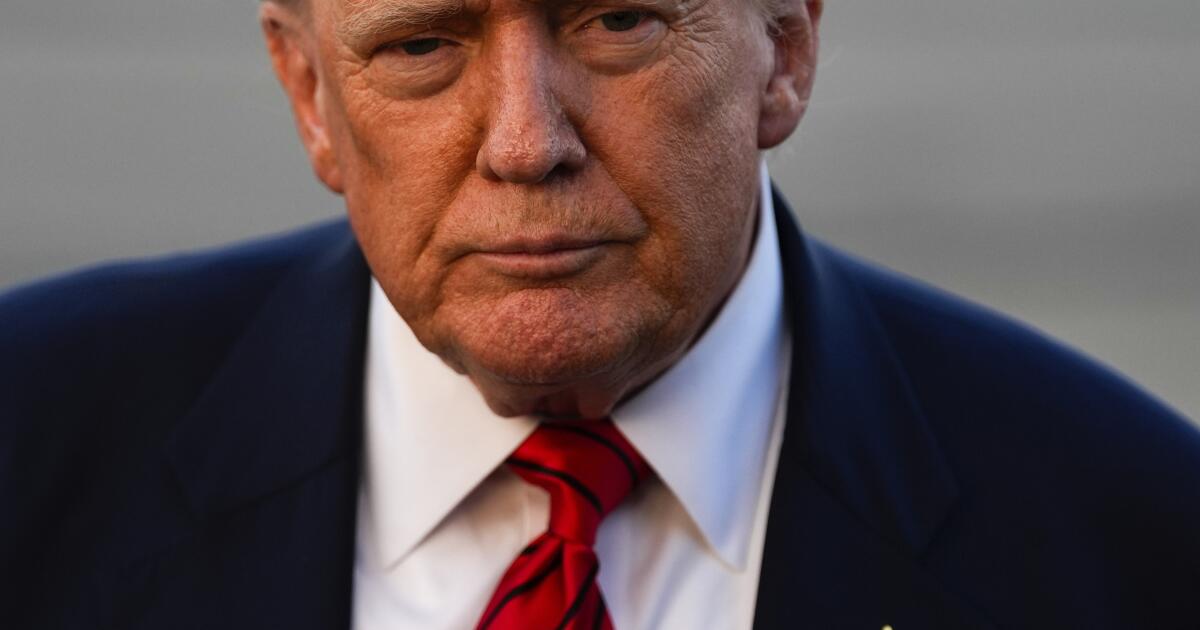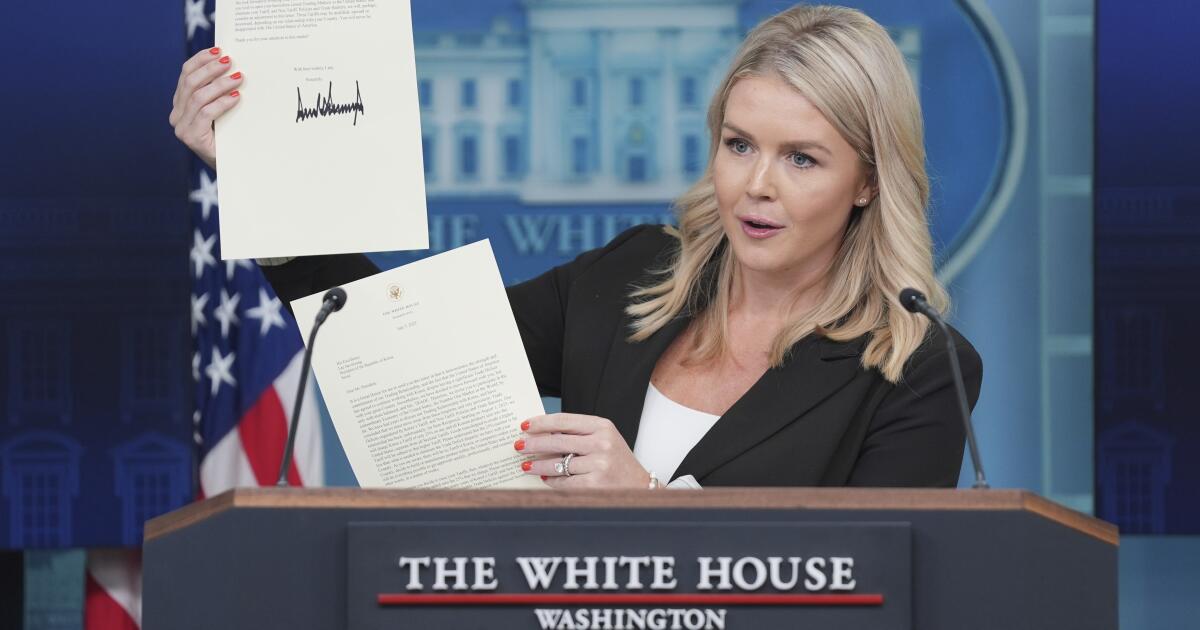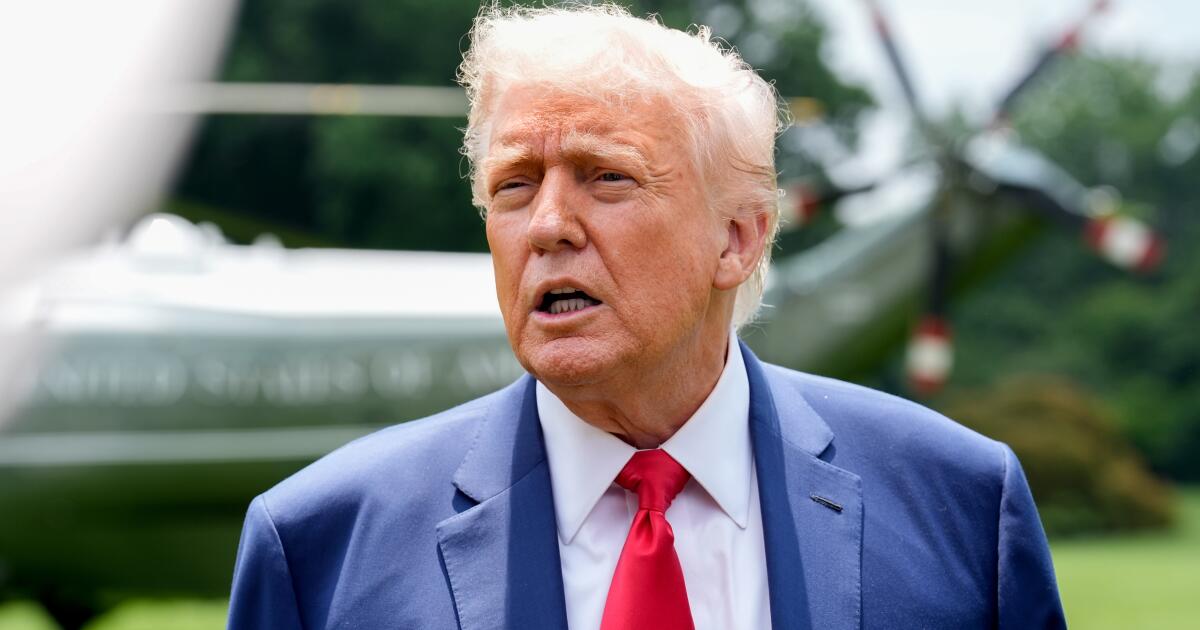Both sides dig in ahead of threatened government shutdown
WASHINGTON — Washington is barreling toward a government shutdown Tuesday night, with few signs of an off-ramp as Democrats and Republicans dig in for a fight over government spending.
Democratic leadership on Capitol Hill is insisting on an extension of Affordable Care Act tax credits as part of a package to fund the government. At least seven Democratic votes are needed in the Senate to pass a seven-week stopgap bill that cleared the House last week.
But Republican lawmakers and the White House have dismissed the proposal, with senior officials in the Trump administration threatening to use unique legal authorities granted during a government shutdown to conduct yet more mass firings of federal workers.
Bipartisan congressional leadership met with President Trump at the White House on Monday afternoon in a last-minute effort to avert the crisis. But neither side exited the meeting with expectations of a breakthrough. On the contrary, Republican leaders in the House told the GOP caucus to plan to return to work next week and said they would hold a news conference on Wednesday anticipating the government’s closure.
“We are not going to support a partisan Republican spending bill that continues to gut the healthcare of everyday Americans, period, full stop,” House Minority Leader Hakeem Jeffries (D-N.Y.) said Monday.
House Minority Leader Hakeem Jeffries and Senate Minority Leader Chuck Schumer talk to reporters outside the White House.
(Alex Brandon / Associated Press)
Vice President JD Vance said he thought the country was “headed to a shutdown,” labeling Democratic calls for healthcare tax credits an “absurd” demand that amounts to an “excuse for shutting down the people’s government.”
“You don’t use your policy disagreements as leverage to not pay our troops,” Vance said. “That’s exactly what they’re proposing out there.”
When the government shuts down, the law requires all nonessential government services to cease, requiring most federal workers to go on furlough or work without pay. Essential services — such as national security functions and air traffic control — are not affected.
Ahead of the meeting, Trump told reporters he hoped Democrats would agree to “keeping our country open,” before proceeding to criticize their proposals.
“They’re going to have to do some things, because their ideas are not very good ones,” Trump said. “They’re very bad for our country. So we’ll see how that works out.”
But Senate Minority Leader Chuck Schumer (D-N.Y.) said he thought his message was beginning to resonate with the president after their meeting Monday afternoon.
“We have very large differences, on healthcare, and on their ability to undo whatever budget we agree to, through rescissions and through impoundment,” Schumer said. “I think for the first time, the president heard our objections and heard why we needed a bipartisan bill. Their bill has not one iota of Democratic input. That is never how we’ve done this before.”
“We’ve made to the president some proposals,” Schumer added. “Ultimately, he’s a decision-maker.”
Schumer faced widespread ridicule from within his party in March after reversing course during the last showdown, choosing then to support the Trump administration’s continuing resolution to fund the government at the height of an aggressive purge of the federal workforce.
At that point, Schumer feared a shutdown could accelerate the firings. But Schumer is now defiant, despite the renewed threat of layoffs, after the White House Office of Management and Budget circulated a memo last week directing federal agencies to relieve workers on discretionary projects that lose funding after Oct. 1.
“This is an attempt at intimidation,” Schumer said in response to the memo. “Donald Trump has been firing federal workers since day one — not to govern, but to scare. This is nothing new and has nothing to do with funding the government.”
Vice President JD Vance talks to reporters as House Speaker Mike Johnson and Senate Majority Leader John Thune listen.
(Alex Brandon / Associated Press)
Still, Schumer began gauging his caucus Monday afternoon on the prospects of a continuing resolution that would in effect delay a shutdown by a week, briefly extending government funding in order to continue negotiations.
Betting markets had chances of a shutdown soaring above 70% by the end of the day on Monday.
Speaking to Fox News on Monday, Karoline Leavitt, the White House press secretary, said the president’s position was “the reasonable and commonsense thing to do,” calling on Democrats to continue funding to the military and its veterans.
“All we are asking for is a commonsense, clean funding resolution — a continuing resolution — to keep the government open,” Leavitt said. “This is a bill that keeps the government funded at the exact same levels as today, just adjusted for inflation.”
“So there is zero good reason for the Democrats to vote against this,” she added. “The president is giving Democrat leadership one last chance to be reasonable.”
But Jeffries dismissed Leavitt as “divorced from reality” in a podcast interview.
“In what world will any rational American conclude, after we’ve been lectured throughout the year about this so-called mandate that the Republican Party has in this country, and their complete control of government in Washington, that because Democrats are unwilling to gut the healthcare of the American people as part of the Republican healthcare crisis, that it’s us shutting the government down?” Jeffries said.
“Nobody’s buying that,” he continued, “outside of the parts of the MAGA base who basically, seemingly, will buy anything that Donald Trump has to peddle.”
Senate Majority Leader John Thune (R-S.D.) said he would call a vote on funding the government Tuesday afternoon.
“This is purely and simply hostage-taking,” Thune said Monday. Whether it passes or fails, he said, is “up to the Democrats.”



